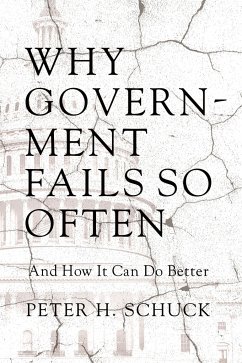
Por Qué Fracasa La Política: Las Cinco Fallas de Nuestro Sistema Político Y Cómo Evitarlas / Why Politics Fails
Versandkostenfrei!
Versandfertig in über 4 Wochen
18,99 €
inkl. MwSt.

PAYBACK Punkte
9 °P sammeln!
Cuáles son las cinco fallas de la política que nos impiden vivir en una sociedad más justa, igualitaria, próspera y sostenible ¿Por qué la política y sus actores siempre nos decepcionan? ¿Por qué padecemos tal grado de desafección política? Y si el problema no son los políticos sino nuestra disonancia cognitiva: Queremos vivir en democracia, pero la voluntad popular es un mito. Anhelamos la igualdad, siempre y cuando no sea nuestra riqueza la que está en juego. Abogamos por la solidaridad, más cuando la recibimos que cuando la damos. Exigimos más seguridad, pero no si limita nue...
Cuáles son las cinco fallas de la política que nos impiden vivir en una sociedad más justa, igualitaria, próspera y sostenible ¿Por qué la política y sus actores siempre nos decepcionan? ¿Por qué padecemos tal grado de desafección política? Y si el problema no son los políticos sino nuestra disonancia cognitiva: Queremos vivir en democracia, pero la voluntad popular es un mito. Anhelamos la igualdad, siempre y cuando no sea nuestra riqueza la que está en juego. Abogamos por la solidaridad, más cuando la recibimos que cuando la damos. Exigimos más seguridad, pero no si limita nuestras libertades. Y queremos una economía próspera, pero lo que nos hace más ricos a corto plazo, nos empobrece a largo plazo. Siempre se repite el mismo patrón: nuestro propio interés perjudica nuestra capacidad para alcanzar objetivos colectivos. Basándose en ejemplos que abarcan desde la antigua Grecia hasta el Brexit el reputado profesor de la Universidad de Oxford demuestra cómo podemos aprender a vivir con nuestras contradicciones de forma que la política vuelva a gozar del prestigio que atesoró. ENGLISH DESCRIPTION What are the five failures of politics that prevent us from living in a more just, egalitarian, prosperous and sustainable society? Why do politics and its actors always disappoint us? Why do we suffer from such a degree of political disaffection? And if the problem is not politicians but our cognitive dissonance: We want to live in a democracy, but the popular will is a myth. We crave equality, as long as it's not our wealth that's at stake. We advocate solidarity, more when we receive it than when we give it. We demand more security, but not if it limits our freedoms. And we want a thriving economy, but what makes us richer in the short term, impoverishes us in the long run. The same pattern is always repeated: our self-interest hurts our ability to achieve collective goals. Drawing on examples ranging from ancient Greece to Brexit, the renowned Oxford University professor demonstrates how we can learn to live with our contradictions so that politics can once again enjoy the prestige it once held.












